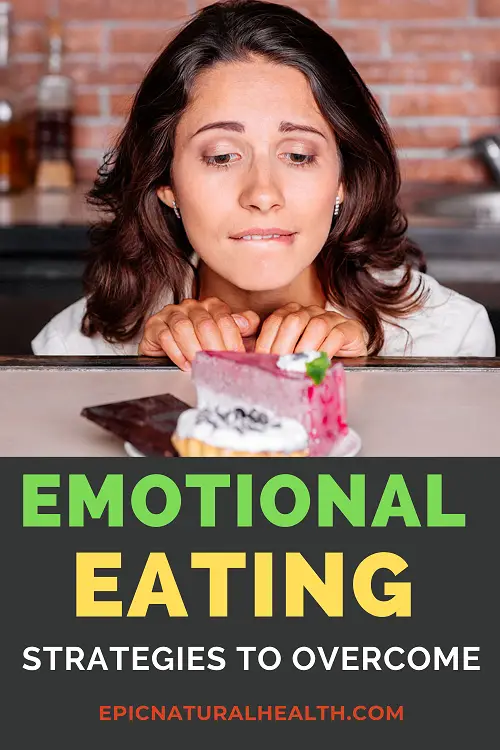At some time or other, we've all eaten a little too much. Whether at a family holiday, when celebrating a special occasion, or just because we haven't eaten all day and we're hungry, eating too much rarely leaves us feeling good about ourselves. For most of us, it's just the uncomfortable sensation of having eaten too much, coupled with the worry of indigestion later on.
Occasionally eating too much isn't the end of the world. However, overeating, or binge eating, can turn into an upsetting and unhealthy eating disorder.

Binge Eating Disorder (BED) is a serious mental health problem that affects many people. A person suffering from BED finds themselves trapped in a cycle of overeating, followed by shame and misery. Weight gain, poor health, anxiety, issues with body image, and depression can all develop due to this condition.
Far too many people don't see binge eating, or emotional eating, as the serious disorder it is. They may perceive themselves as having no self-control, or just greedy. In fact, this may be something loved ones have said to them.
This isn't true, and hearing that your binge eating is caused by your own weakness causes people to feel worthless and ineffectual. It's a bad cycle, because those sorts of feelings can also trigger emotional eating.
Binge eating is a coping mechanism often caused by emotional or mental health triggers. It may be caused by stress or anxiety, along with a whole raft of emotional situations. This causes periods where a person eats large amounts of food, whether throughout the day or in one sitting, regardless of whether they're hungry or not.
While overeating provides a brief feeling of relief and fullness, this feeling rapidly subsides. This can leave a sufferer feeling even worse than before.
Taking control of a binge eating disorder isn't easy. In fact, it can be a long-term battle to beat emotional eating. Strategies to stop binge eating often focus on the root cause of the disorder. This article will discuss the simple tips you can follow to help you break the cycle and get your eating behavior back in control.
1. Avoid Fad Diets
Binge eating can cause a person to rapidly gain weight. While our automatic response might be to jump straight into a strict diet to counteract this, this often won't work.
Fad diets often work by severely restricting food intake with a focus on eating only a small percentage of our daily calorie requirements, or even eliminating whole food groups. While this may have a small impact on weight gain due to binge eating, in the long run, it'll make the problem worse.
A restrictive diet may actually strengthen cravings. If you cut a food group out of your diet or restrict your calorie intake, your brain is going to begin craving certain foods.
These cravings can have you reaching for sugary snacks, junk food, or high-calorie items. These increased cravings can make you more likely to eat more than before.
2. Eat Mindfully

If you find yourself snacking without thinking, even when you aren't hungry, mindfulness is something to consider. Mindfulness, a self-help practice often associated with yoga and meditation, involves taking the time to slow and listen to your body, and, for many, can be the first step towards better health.
Our high-speed, busy lives lend themselves to eating on the go, skipping meals, only stopping to eat mindlessly in front of the TV or computer, and generally ignoring our bodies until a problem develops. Practicing mindfulness involves forcing ourselves to slow down and take stock of our bodies. Slowing down and paying attention can help us to notice when we're feeling hungry and when we're not. Then we're in the position to decide whether to eat or not.
When you eat mindfully, your goal is also to slow down while you eat. Slowing down helps us to recognize when we're full. It also focuses our attention on what we eat. While you're eating, focus on each mouthful. Savor the flavors, take note of the textures, and chew thoroughly.
It may take some time to get into this habit, but mindful eating can really enhance your enjoyment of food and reduce the urge to overeat in the moment. You can use this method with that delicious piece of cake, when you choose to indulge!
3. Don't Skip Meals

People suffering from binge eating disorders often feel like they need to punish themselves afterward. The "punishment" often comes in the form of denying themselves certain foods, and it makes them feel that they're "in control". A person might reason that skipping a meal or two will undo the damage their binge eating session has done.
However, this can make the situation worse in the long run when it comes to health and self-esteem. Skipping breakfast, lunch or dinner can make you more likely to experience hunger pangs later on. The best way to bring your eating under control is to create a good eating plan - and stick to it.
Eating regularly keeps your blood sugar balanced, and keeps your body on track. It's also the best way to combat cravings, support yourself towards better health, and deal with binge eating.
4. Stay Hydrated

Eating habits aside, drinking plenty of water is crucial to our health and wellbeing. However, drinking plenty of water is also linked to feelings of decreasing hunger. If you're concerned about overeating at mealtimes, drinking a glass of water before a meal can aid digestion and make you feel full sooner.
Good hydration can boost our metabolism, as well as keeping our body healthy. A healthy body and fast metabolism is key to weight loss.
We may also find ourselves tempted to overeat when we're bored or stressed. Drinking a glass of water before you make any eating decisions can help you find out whether you're really hungry or not. This should help you to naturally lose weight, simply because you're drinking more and eating less.
5. Don't Keep Junk Food in the House

One of the best things you can do to beat a binge eating disorder is to remove the temptation. Keeping junk food in the house is asking for trouble. How many of us have the willpower to leave that tub of ice cream in the freezer, when all we have to do is go to into the kitchen?
However, don't make the mistake of getting rid of virtually all of the food in your house. Replace junk food or sugary food with healthy alternatives.
Fruit, vegetables, nuts, and other healthy snacks make great snacking options. This means that when you are hungry, you won't resort to getting takeout or making a late-night drive to the store - both of which may trigger mental health issues if you're trying to tackle your symptoms.
Of course, while getting rid of the temptation is a key part of breaking a cycle of food binges, this alone likely won't be enough to quell your cravings for the rest of your life.
6. Add More Fiber to Your Diet
Food that's high in fiber nourishes the digestive system and makes you feel fuller for longer. High-fiber foods are a key part of beating cravings, since they provide protein, energy, and have a filling effect. Junk food, on the other hand, has the opposite effect. Fast food, for example, is high-calorie but carries almost no nutritional value, and when you eat this sort of food, you're likely to feel hungry again only an hour or two later.
Fruits, vegetables, whole grains, and more are all high-fiber foods. Making a concerted effort to eat fiber-rich food in your diet can help you feel full and energized throughout they. High protein and high fiber foods are a must if you're planning to introduce more exercise to your lifestyle.

7. Exercise

Exercise can be a fantastic mood booster. In fact, exercise can help you stop binge eating, and for many people, it acts as a sort of therapy in itself. While an eating disorder is a serious problem that should be addressed properly, adding exercise to your lifestyle can help to decrease stress levels and boost low mood. Increased mood can go a long way to removing the emotional root causes of bingeing.
8. Keep a Food Journal

Binge eating often causes mindless eating, as well as boredom snacking. It can even get to the point where, at the end of the day, we can't remember what we've eaten. This can allow eating habits to spiral out of control, and ruins any possibility of identifying triggers.
Keeping a food journal can encourage mindful eating and help you to avoid the urge to overwat. Recording what you eat at every point of the day - including impulse snacking - can reveal patterns and bad habits that may be factors that cause you to overeat in the moment.
A good tip is to use your food journal as a mood tracker, too. Recording how you felt and what was going on whenever you felt the urge to eat helps to identify emotional triggers. For example, an argument with a friend or relative can lead to emotional eating. Once you've identified the triggers, you can work to combat them.
9. Get Plenty of Sleep

Sleep is the body's way of resting and renewing. Poor sleep impacts our health, not least of all our appetite and metabolism. Poor sleep can lead to poor weight loss, as well as stronger cravings later on. Getting less than eight hours of sleep a night can be a recipe for emotional eating the next day.
10. Add More Protein to Your Diet
Just like fiber, protein-rich foods can make you feel fuller for longer, as well as nourishing your body and keeping you healthy. Foods with plenty of protein can help boost the metabolism, promoting healthy weight loss and keeping you energized.

Protein-rich foods keep you feeling fuller for longer,helping to stop the risk of cravings and subsequent emotional eating later on.
Some protein-rich foods include:
- Meat
- Eggs
- Nuts and seeds
- Legumes
These are versatile foods that can be made into any number of delicious dishes!
11. Talk About Your Feelings
Binge eating, or emotional eating, often carries a feeling of shame. A person suffering from binge eating may try to hide their disorder, feeling that their friends and family won't understand their symptoms. However, emotional eating is a disorder like any other. Talking to a trusted loved one when you feel like overeating can make the difference between giving in and pushing through.
This is because a good support system can put a stop to stress, making us feel loved and understood. Since food binges are often an emotional response to loneliness, depression, anxiety, stress, and other conditions, a social support system could give us the strength to power through.
However, seeking further help to put a stop to an eating disorder may be necessary. A medical professional can help a person suffering from binge eating to create a plan. Treatment, like therapy, may also be necessary.
Sometimes, the causes of emotional eating aren't clear. A professional can help you establish what is triggering binge eating, and maybe even give you some advice for weight loss, if necessary. Then you can come up with a treatment plan together that'll help you get back to your old self.
12. Plan Ahead

Creating a meal plan for the week ahead is the best way to prepare for cravings. Knowing that you have a delicious, pre-prepared meal to come home to can make the difference between eating junk food and eating good food.
Breaking the cycle of binge eating isn't easy. There will be times when you struggle, especially when the urge to eat your cravings are strong. But knowing that you have regular, planned dishes can help you to power through. Meal planning can also help you to manage portion sizes. This means that if you do choose to treat yourself to a favorite food, you can enjoy that food, free of the worry of overindulging.
You Can Break the Cycle of Binge Eating
Binge eating is a recognized psychological condition, and a serious eating disorder. It makes countless people miserable, and can have a nasty impact on a person's health.
That doesn't mean that you can't beat binge eating.
We're all individuals, and it's up to you to decide which tips in this article are best for you. However, almost without exception, the best thing for an individual to do is to reach out.
Speaking to a friend or trusted family member is often the first step to taking back control of your life and your eating. Remember to book in with a professional, who can provide medical advice, diagnosis or treatment, if you need help losing weight or managing you mental health challenges. Binge eating is unpleasant and unhealthy, but you aren't alone. Others have broken the cycle, and so can you.

